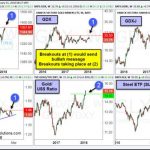Recent market twirls resulting from worries over the sooner-than-expected end of cheap dollars and shake-ups in the Chinese market have quivered investor confidence in the U.S. equity markets. Even though investors averted the Fed rate hike this month, they cannot put it off for long.
Later this year or the beginning of 2016 (to the maximum stretched level) should see a lift-off in Fed rates, after almost after a decade. Steady growth in the U.S. economy should offset ripples emanating from the occasional China issues and subdued inflation on low oil prices.
This makes sense for investors to seek alternative and promising investment avenues in some better-insulated areas. Though it would be imprudent to call foreign economies a smarter bet than America at a first glance (as the majority of developed economies are struggling to ward off deflationary worries and boost growth), a flurry of monetary easing to rev up these waning economies make international equities and the related ETFs intriguing bets right now.
Japan is presently pursuing an ultra-easy monetary policy and the European Central Bank (ECB) has launched a QE program with most European nations pursuing a rock-bottom interest rate policy. Further, the ECB president Mario Draghi recently pledged for a more intensified and protracted QE measure in the Euro zone, if needed (read: Dovish Draghi Drives Up These European ETFs).
The ECB now expects Euro zone inflation of 1.1% for next year, down from its June forecast of 1.5%, and GDP growth of 1.7% against the prior expectation of 1.9%. Current inflation in the Euro zone is 0.2% but might run into the deflationary zone later on this year, per Draghi. Such downbeat revisions definitely create a backdrop for a beefed-up QE policy.
Japan is also leaving no stone unturned in charging up its cooling economy as Japan’s prime minister Shinzo Abe recently talked about seeking new reforms including a corporate tax cut. Abe is looking for a tax cut of at least 3.3% to 31.33% next year, starting April 2016 from the current 34.62% and aims to bring it down to the twenties over the next several years (read: China Stimulus Raises Hopes: Japan ETFs to Lead)
Moreover, thanks to the latest market upheaval induced by the Chinese market rout and the Fed lift-off ambiguity, most foreign stocks suffered steep sell-offs and returned to a compelling valuation. All these make international equities, especially the small-cap ones, intriguing for decent gains, if not stellar, in the coming days.
Why Small-Caps?
Small caps are considered the measure of domestic economy. In a growing economy, these pint-sized securities perform the best as these generate most of their revenues from the domestic market. These are less ruffled by global economic concerns.
The foreign small-cap ETF space has returned on par with the large-cap ETF area so far this year (the highest gain seen by over 6% for both capitalizations), while the biggest U.S. ETF SPY has remained in red.
















Leave A Comment